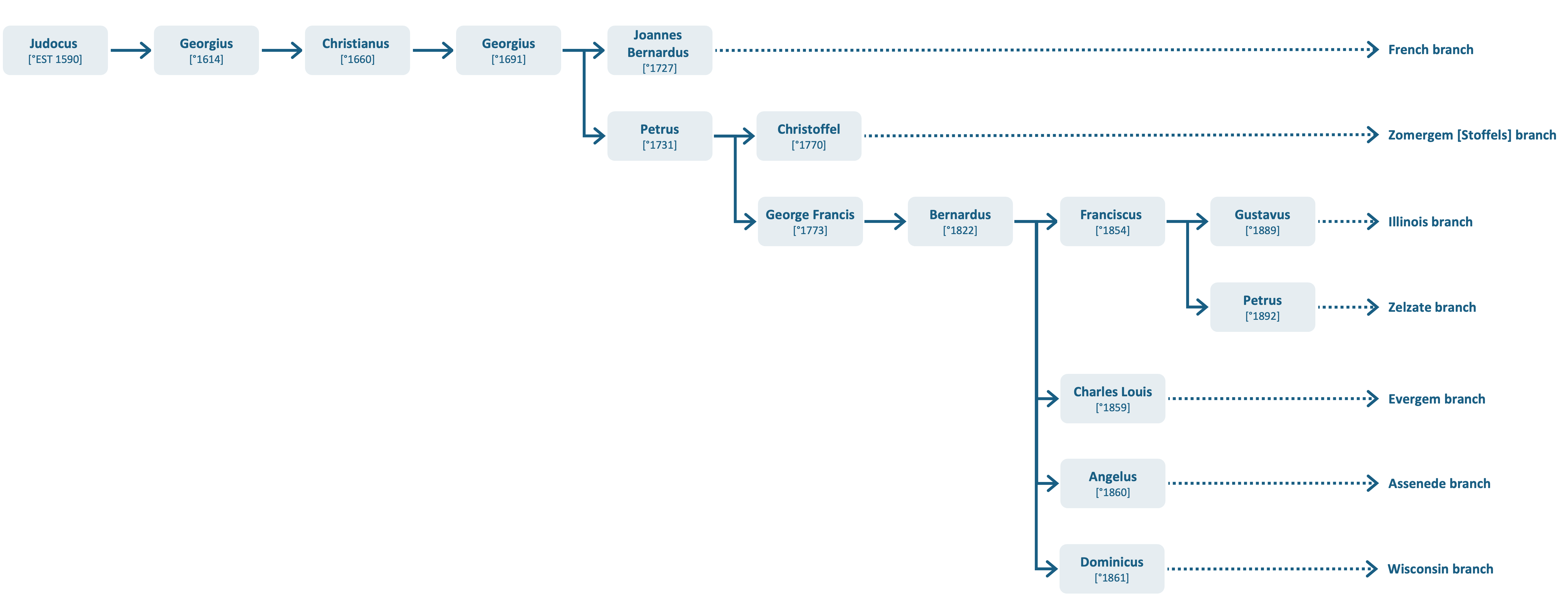Wulgaert History
Name
Wulgaert refers to wulg, which is old-dutch for willow tree. This is what the etymological dictionary of surnames in Belgium has to say about the Wulgaert surname:
| Meaning: | Surname that refers to a place name place where willows grow (Dutch: Wilg / Wulg) |
|---|---|
| Other similar names: | van der Wilgen, van der Willi(n)gen, Verwilg(h)en, -ghem, Verwilligen, Verwulgen, -gem |
Source: Dr. F. Debrabandere; Verklarend woordenboek van de familienamen in België en Noord-Frankrijk, 1993, Het Gemeentekrediet
Indeed, the name Wulgaert (or variations thereof such as Wulghaert, Wulgaerdeken) can also sometimes be found in topology maps referring to a particular field or location that was surrounded by or otherwise marked by willow trees. E.g. a Wulgaerdeken field in present-day Beervelde referenced in 16th and 17th century maps, or a Wulghaert field in present-day Zomergem referred to in 16th century registration documents.
Ancestry
The ancestors of all current living Wulgaerts can be traced back to the 16th century in Sleidinge (East-Flanders province) in Belgium (obviously back then Belgium did not exist yet as a country as it was only founded in 1830).
The end of the 16th and beginning of the 17th century was a troubling time for the region as it was in the midst of the eighty years' war which was a result from the reformation and the Dutch revolt (1568 to 1648). The Dutch revolt was the revolt in the Low Countries against the rule of the Habsburg King Philip II of Spain, hereditary ruler of the provinces. The northern provinces (present-day the Netherlands) eventually separated from the southern provinces (present-day Belgium and Luxembourg and parts of French Flanders), which continued under Habsburg Spain until 1714. The northern provinces adopted Calvinism whereas the southern provinces became Catholic again due to the expulsion of Protestants and the efforts of the Counter-Reformation. After the Spanish-Habsburg rule, the southern provinces came under Austrian-Habsburg rule and then French rule. When Napoleon was defeated in 1815, the Low Countries were reunited for a short while until the independence of Belgium in 1830.
These 16th century ancestors are however not the oldest persons with a Wulgaert name of which records have been found. The oldest (potential) ancestors with the name Wulgaert I have currently been able to find are:
- A man named Willem or Willemme Wulgaert, a shoe maker living in the mid 15th century in Gent (Ghent, East-Flanders province) in Belgium and probably born in the beginning of the 15th century.
- A man named Abin Wulgaert living in the early 15th century in Gent (Ghent, East-Flanders province) in Belgium and probably born at the end of the 14th century (about 1380).
- A man named Peter Wulgart can be found referenced in a still older source of 1367 of Puiflijk, Druten, Gelderland.
Today's living Wulgaerts can be roughly split in the following branches:
- French (speaking) branch
- Eeklo branch
- Zomergem (or Stoffels) branch
- Evergem-1 branch
- Illinois Rock Island branch
- Zelzate branch
- Evergem-2 branch
- Assenede branch
- Wisconsin branch

They all trace back to sons of Georgius Wulgaert °1691:
- Joannes Bernardus (°1727) - The French (speaking) branch and Eeklo branch trace back to Joannes Bernardus
- The French (speaking) branch traces back to Joannes Bernardus' great-granddaughter Leopoldina Xaveria (°1844) and her illegitimate son Louis (°1867). The branch includes people that live in the north of France, close to Belgium (French Flanders), as well as some later descendants now living in the French speaking south of Belgium (Luxemburg province).
- The Eeklo branch traces back to Joannes Bernardus' great-grandson Desire (°1842). The branch includes people that live in or near Eeklo.
- Petrus Wulgaert (°1731) - The other branches trace back to Petrus.
- The Stoffels or Zomergem branch traces back to Christoffel Wulgaert (°1770), son of Petrus. Christoffel moved to Zomergem, a town where the Wulgaerts today are still sometimes referred to as 'Stoffels', referring back to Christoffel, the first Wulgaert that came to live in Zomergem.
- The Evergem 1, Wisconsin, Illinois, Zelzate, Assenede and Evergem 2 branches are descending from George Francis (°1773).
- The Evergem-1 branch traces back to Dominicus (°1820), son of George Francis.
- George Francis' son Bernardus (°1822) had several sons, and they represent the next branches:
- The Illinois Rock-Island branch descends from Franciscus Wulgaert (°1854), son of Bernardus. They are descending from Gustavus Wulgaert (°1889), the son of Franciscus, who migrated to Illinois in 1913.
- The Zelzate branch also descends from Franciscus Wulgaert (°1854), son of Bernardus. They are the descending from Petrus Wulgaert (°1892), son of Franciscus.
- The Evergem-2 branch descends from Charles Louis Wulgaert (°1859), son of Bernardus.
- The Assenede branch descends from Angelus Wulgaert (°1860), son of Bernardus.
- The Wisconsin branch descends from Dominicus Wulgaert (°1861), son of Bernardus. Dominicus migrated to Wisconsin in 1889. Later his nephew Bernard (°1882), son of Petrus Bernard (°1856), Dominicus' brother, would follow Dominicus. After Dominicus died, Bernard married Dominicus' wife Stephania Caus.